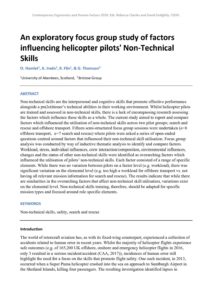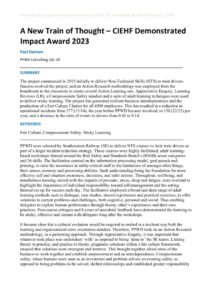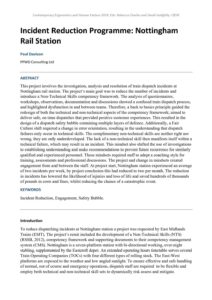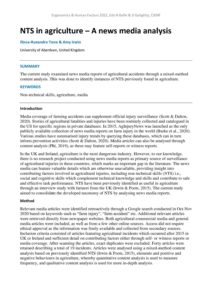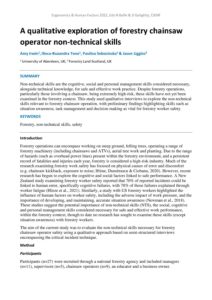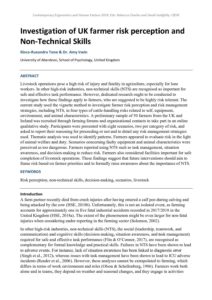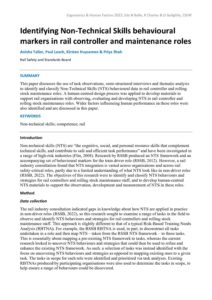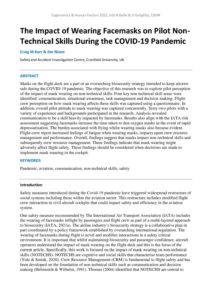Non-technical skills
An exploratory focus group study of factors influencing helicopter pilots’ Non-Technical Skills
| Document | Author O. Hamlet, A. Irwin, R. Flin, & G. Thomson |
| Abstract Non-technical skills are the interpersonal and cognitive skills that promote effective performance alongside a pra2ctitioner’s technical abilities in their working environment. Whilst helicopter pilots are trained and assessed in non-technical skills, there is a lack of encompassing research assessing the factors which influence these skills as a whole. The current study aimed to report and compare factors which influenced the utilisation of non-technical skills across two pilot groups; search and rescue and offshore transport. Fifteen semi-structured focus group sessions were undertaken (n=8 offshore transport, n=7 search and rescue) where pilots were asked a series of open-ended questions centred around factors that influenced their non-technical skill utilisation. Focus group analysis was conducted by way of inductive thematic analysis to identify and compare factors. Workload, stress, individual influences, crew interaction/composition, environmental influences, changes and the status of other non-technical skills were identified as overarching factors which influenced the utilisation of pilots’ non-technical skills. Each factor consisted of a range of specific elements. While there was no variation between pilots on a factor level (e.g. workload), there was significant variation on the elemental level (e.g. too high a workload for offshore transport vs. not having all relevant mission information for search and rescue). The results indicate that while there are similarities in the overarching factors that affect non-technical skill utilisation, variations exist on the elemental level. Non-technical skills training, therefore, should be adapted for specific mission types and focused around role specific elements. |
A New Train of Thought – CIEHF Demonstrated Impact Award 2023
| Document | Author Paul Davison |
| Abstract The project commenced in 2015 initially to deliver Non-Technical Skills (NTS) to train drivers. Success evolved the project, and an Action Research methodology was employed from the boardroom to the classroom to create several Action Learning sets. Appreciative Enquiry, Learning Reviews (LR), a Compassionate Safety mindset and a suite of adult learning techniques were used to deliver sticky learning. The project has generated resilient business interdependence and the production of a Fair Culture Charter for all 4500 employees. This has resulted in a reduction in operational incidents from 277 (13/14), the year before PPWD became involved, to 150 (22/23) per year, and a decrease in the ratio of events to drivers from 0.43 to 0.14. |
Incident Reduction Programme: Nottingham Rail Station
| Document | Author Paul Davison |
| Abstract This project involves the investigation, analysis and resolution of train dispatch incidents at Nottingham rail station. The project’s main goal was to reduce the number of incidents and introduce a Non-Technical Skills competency framework. The analysis of questionnaires, workshops, observations, documentation and discussions showed a confused train dispatch process, and highlighted dysfunction in and between teams. Therefore, a back to basics principle guided the redesign of both the technical and non-technical aspects of the competency framework; aimed to deliver safe, on time dispatches that provided positive customer experiences. This resulted in the design of a dispatch safety bubble containing multiple layers of defence. Additionally, a Fair Culture shift required a change in error orientation, resulting in the understanding that dispatch failures only occur in technical skills. The complimentary non-technical skills are neither right nor wrong, they are only underdeveloped. The lack of a non-technical skill then manifests itself within a technical failure, which may result in an incident. This mindset also shifted the use of investigations to establishing understanding and make recommendations to prevent future recurrence for similarly qualified and experienced personnel. These mindsets required staff to adopt a coaching style for training, assessments and professional discussions. The project and change in mindsets created engagement from and between the staff. At project start, Nottingham station experienced an average of two incidents per week, by project conclusion this had reduced to two per month. The reduction in incidents has lowered the likelihood of injuries and loss of life and saved hundreds of thousands of pounds in costs and fines, whilst reducing the chance of a catastrophic event. |
NTS in agriculture – A news media analysis
| Document | Author Ilinca-Ruxandra Tone & Amy Irwin |
| Abstract The current study examined news media reports of agricultural accidents through a mixed-method content analysis. This was done to identify instances of NTS previously found in agriculture. |
A qualitative exploration of forestry chainsaw operator non-technical skills
| Document | Author Amy Irwin1, Ilinca-Ruxandra Tone, Paulina Sobocinska & Jason Liggins |
| Abstract Non-technical skills are the cognitive, social and personal management skills considered necessary, alongside technical knowledge, for safe and effective work practice. Despite forestry operations, particularly those involving a chainsaw, being extremely high-risk, these skills have not yet been examined in the forestry context. This study used qualitative interviews to explore the non-technical skills relevant to forestry chainsaw operation, with preliminary findings highlighting skills such as situation awareness, task management and decision-making as vital for forestry worker safety. |
Investigation of UK farmer risk perception and Non-Technical Skills
| Document | Author Ilinca-Ruxandra Tone & Dr. Amy Irwin |
| Abstract Livestock operations pose a high risk of injury and fatality in agriculture, especially for lone workers. In other high-risk industries, non-technical skills (NTS) are recognised as important for safe and effective task performance. However, dedicated research ought to be conducted to investigate how these findings apply to farmers, who are suggested to be highly risk tolerant. The current study used the vignette method to investigate farmer risk perception and risk management strategies, including NTS, in four types of cattle-handling risks related to self, equipment, environment, and animal characteristics. A preliminary sample of 50 farmers from the UK and Ireland was recruited through farming forums and organisational contacts to take part in an online qualitative study. Participants were presented with eight scenarios, two per category of risk, and asked to report their reasoning for proceeding or not and to detail any risk management strategies used. Thematic analysis was used to identify patterns. Farmers appeared to evaluate risk in the light of animal welfare and duty. Scenarios concerning faulty equipment and animal characteristics were perceived as too dangerous. Farmers reported using NTS such as task management, situation awareness, and decision-making to reduce risk. Farmers also considered facilities important for safe completion of livestock operations. These findings suggest that future interventions should aim to frame risk based on farmer priorities and to formally raise awareness about the importance of NTS. |
Identifying Non-Technical Skills behavioural markers in rail controller and maintenance roles
| Document | Author Anisha Tailor, Paul Leach, Kirsten Huysamen & Priya Shah |
| Abstract This paper discusses the use of task observations, semi-structured interviews and thematic analysis to identify and classify Non-Technical Skills (NTS) behavioural data in rail controller and rolling stock maintenance roles. A human-centred design process was applied to develop materials to support rail organisations with observing, evaluating and developing NTS in rail controller and rolling stock maintenance roles. Wider factors influencing human performance in these roles were also identified and are discussed in this paper. |
The Impact of Wearing Facemasks on Pilot Non-Technical Skills During the COVID-19 Pandemic
| Document | Author Craig M Kerr & Jim Nixon |
| Abstract Masks on the flight deck are a part of an overarching biosecurity strategy intended to keep aircrew safe during the COVID-19 pandemic. The objective of this research was to explore pilot perception of the impact of mask wearing on non-technical skills. Four key non-technical skill areas were identified: communication, situational awareness, task management and decision making. Flight-crew perception on how mask wearing affects these skills was captured using a questionnaire. In addition, overall pilot attitude to mask wearing was captured concurrently. Sixty-two pilots with a variety of experience and backgrounds participated in the research. Analysis revealed communication to be a skill heavily impacted by facemasks. Results also align with the IATA risk assessment suggesting facemasks increase the time taken to don oxygen masks in the event of rapid depressurisation. The burden associated with flying whilst wearing masks also became evident. Flight-crew report increased feelings of fatigue when wearing masks, impacts upon crew resource management and performance. Overall, findings suggest that masks impact non-technical skills and subsequently crew resource management. These findings indicate that mask wearing might adversely affect flight safety. These findings should be considered when decisions are made to implement mask wearing in the cockpit. |

